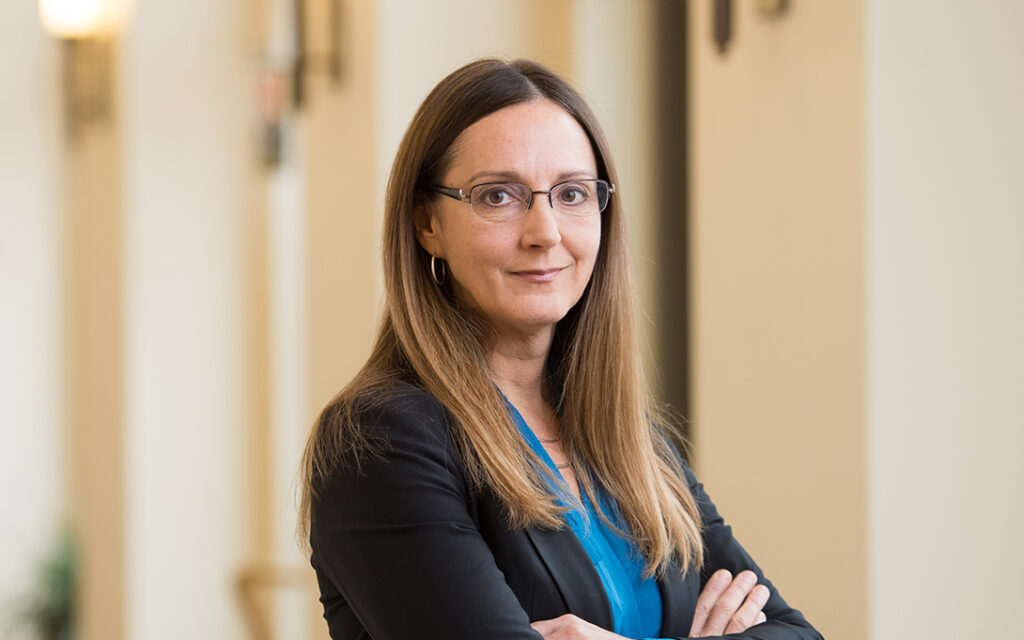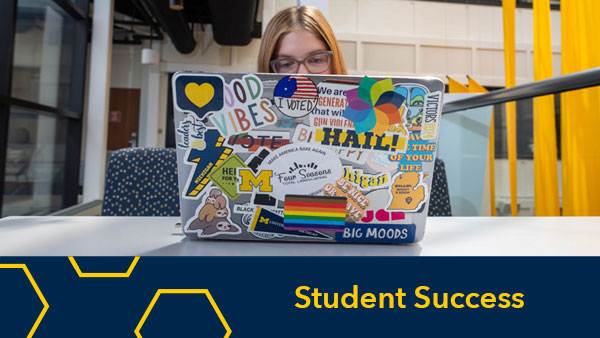
In partnership with CAI, Ford School professor Liz Gerber was able to take an idea scribbled on a napkin and turn it into a powerful simulation tool for teachers and students.
Sean Corp, Content Strategist
Following more than 100 simulations involving more than 4,000 users ranging from high schoolers to graduate students at colleges and universities, ViewPoint, the role-playing simulation and collaboration software, is entering a licensing agreement with Summit Venture Studio to further development and provide access to a national audience.
ViewPoint began development in 2016 when faculty innovator Liz Gerber, professor of public policy at the Ford School, reached out to James DeVaney, the University of Michigan’s associate vice provost of academic innovation. She wanted to develop a dynamic software solution that could replace an increasingly unsustainable pencil-and-paper method of creating, conducting and tracking role-playing simulations with her students.
Seeing the potential for role-based simulation software across the university, Academic Innovation established a new partnership led by Gerber and Ben Hayward, then a lead application architect, to create a flexible software toolkit to support scenario-based practice and learning. That core relationship continued up to 2023.
“To be able to work on ViewPoint with Ben and his team, and to be able to imagine and innovate in this space has been such an incredible experience for me,” Gerber said.

In the beginning, Hayward and his team evaluated the needs of campus audiences across disciplines such as public policy, business, medicine, and public health. Hayward said building the first version of ViewPoint, then called Policymaker, required a team effort involving user experience designers, software developers, behavioral scientists, and implementation specialists.

“Liz is an outstanding expert in simulation design and brought a clear understanding of what the ingredients were that made a simulation work. It was exciting to partner with her and our design team on how we could build those concepts into a simulation tool that could work for students and educators. From the very beginning of this project, we were in sync on how to build something that would help bring these simulations to life and make them sustainable,” said Hayward, now the senior director of education technology at CAI.
As the potential applications expanded beyond the scope of Gerber’s needs at the Ford School of Public Policy, the CAI team worked closely with stakeholders across the campus to ensure that the tool was accessible to anyone interested in role-playing simulations. Eventually, the tool became known as ViewPoint.

“Our collaboration with Dr. Gerber on ViewPoint has been an important initiative at the Center for Academic Innovation. We were able to work together to harness technology in ways that helped people collaborate, learn alternative points of view, and tackle big challenges,” said James DeVaney, associate vice provost for academic innovation and founding executive director of the center. “It’s a perfect example of what is possible when we create student success and learning innovation solutions with, not simply for, faculty and students. ViewPoint is ready to move into its next phase of growth and is poised to further impact education, collaboration and workforce training.”
New Opportunities with New Partnership
The licensing agreement with Summit Venture Studio means the continued development of ViewPoint as the team expands its potential. Summit sees ViewPoint as the perfect tool to grow critical leadership, teamwork, and communication skills while enhancing collaboration in online, in-person and hybrid educational settings.
“This company will allow universities and colleges to provide more effective group simulations and improve educational engagement and performance. Additionally, with ViewPoint, we’ll be bringing educational simulations to the management training industry,” said Taylor Bench, managing director at Summit.
Gerber is excited about the future of ViewPoint as it transitions from its first home at the center.
“Leveraging Summit’s experience, resources and capabilities in the ed tech/software space, we are excited for the new opportunities this partnership promises,” Gerber said. “We couldn’t have gotten here without CAI, but this is the next step to ensure we get the most out of all the time, money, and resources we’ve invested in ViewPoint. This will allow us to get ViewPoint into the hands of even more teachers and students who can benefit from it.”
The Origins of ViewPoint
ViewPoint was actually conceived around 2010 in the most unlikely place – at 3 a.m. in a hotel lobby in Hawaii. Gerber was on a family vacation, and she couldn’t sleep as she thought about all the work awaiting her upon a return to Michigan. Among the tasks was a series of simulations she planned to run in her classes, which required meticulous planning.
“My head was spinning, and I wondered to myself if there was a technical solution to all the effort I was putting into mapping things out by hand,” Gerber said. “Suddenly, I found myself sitting in the lobby of this hotel at 3 a.m. with five pages of notes and the original sketch for Policymaker.”
There was just one problem, Gerber said.
“I didn’t even know who I could ask to help make it a reality.”
Four years later, she had that fateful meeting with DeVaney, which led to the development of and support for ViewPoint at the Center for Academic Innovation.
In anticipation of pursuing the project, Hayward observed Gerber’s three-day simulation called the Integrated Policy Exercise at the Ford School. Based on what they learned from observations, market research, and student interviews, they began work on Policymaker.

Eventually renamed ViewPoint, the simulation tool was used in additional U-M residential courses and student experiences, including the Sanger Leadership Center’s Crisis Challenge in 2019.
As part of the Crisis Challenge, teams at the Ross School of Business adopted particular roles in a crisis and had 24 hours to develop a response. Along the way, the teams received new updates that forced them to adjust their plans.
Soon, other schools started to use ViewPoint to build simulations, including Ball State, Boston College, Harvard, Georgetown, Stanford, and even high schools like Owego Free Academy.
In 2022, ViewPoint was used across the Big 10 in the Democracy In the 21st Century collaboration exercise.
A New Chapter
ViewPoint is popular because it makes simulations more real for the participants, Gerber said. It facilitates communication and collaboration through a series of integrations, bringing the simulations to life.
“It brings role playing to life. Students always love that. The news feeds, the social media feeds, and the ability to really immerse yourself in your role. The teachers love it because it provides templates, instructions and features that show you where to start, how to conduct a simulation, and how to sustain it.”
Now, Gerber said she is ready for the next phase of ViewPoint.
“It’s bittersweet to leave this partnership with CAI. We’re not closing the book, but this is definitely going to be a new chapter,” she said.


